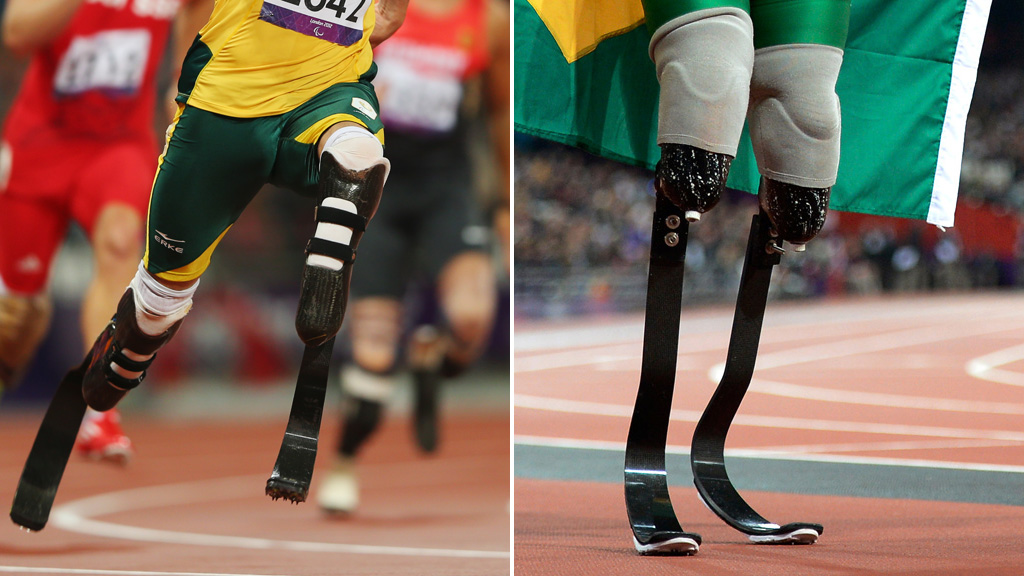‘Blade runner’ Oscar Pistorius sorry for ‘unfair’ comments
Oscar Pistorius apologises for the timing of his comments about the running blades used by T44 200 metres rival Alan Fonteles Oliveira, who beat the South African to the gold medal on Sunday.
After losing the T4 200m in an astonishing final to Brazil’s Alan Oliveira, the South African claimed that length of the winner’s artificial limbs gave him an unfair advantage.
It emerged today that Pistorius had complained twice this summer to the International Paralympic Committee (IPC) about the rules on running blades. Six weeks ago, he rang the IPC’s communications director Craig Spence to express his concern about a rival’s blades.
Paralympic poster boy Pistorius was the favourite to win last night, but Brazil’s Alan Oliveira raced ahead in the final 60m, taking over from the South African to win gold in an incredible finish.
Speaking after the race, Pistorius said that the Brazilian’s long legs, helped by longer artificial limbs, meant that it was not a “fair race”.
I would never want to detract from another athlete’s moment of triumph. Oscar Pistorius
He also hit out at the International Paralympic Committee (IPC) for failing to act over the length of some athletes’ blades.
But in a statement released to Press Association Sport this morning, Pistorious said: “I would never want to detract from another athlete’s moment of triumph and I want to apologise for the timing of my comments after yesterday’s race.”
FactCheck: Why Pistorius's complaint is a tall story
The statement continued: “I do believe that there is an issue here and I welcome the opportunity to discuss with the IPC but I accept that raising these concerns immediately as I stepped off the track was wrong.
“That was Alan’s moment and I would like to put on record the respect I have for him.”
Pistorius added that he is happy to work with the IPC on the issue.

Approved blades
The Brazilian took gold in 21.45 seconds, leaving Pistorius to settle for silver, coming home in 21.52 seconds with stunned quiet from the 80,000 spectators greeting the result.
Responding to Pistorius’s claims, Oliveira said that the length of his blades had been approved by the IPC and that he had not changed them during the competition.
The IPC have released a statement on the rules that in place regarding prosthetic blades and revealed that Pistorius had requested a meeting after last night’s race.
The statement added: “Since 2010 athletes competing at IPC international competitions have been checked at regular occasions in the Call Room prior to participation.
“At the London 2012 Paralympic Games all athletes competing in T42/43/44 events (above knee and below knee lower leg amputees) have had their prosthesis measured against the IPC Athletics Rules.
“All athletes competing in the Men’s 200m T44 final were checked by international classifiers in the Call Room ahead of the race. All were within the regulations outlined in the IPC Athletics Classification Handbook.
Pistorius beat the world record in his qualifying heat for the 200m, but he failed to run as fast on Sunday evening. As well as the phone call to Craig Spence, a member of Pistorius’ public relations team contacted the IPC last week to warn that the athlete was likely to raise his concerns about the rules on blades during the Games.
Mr Spence said: “So last night, as soon as the result happened and I saw Oscar on Channel 4, I knew that we were going to have to face the issue.”
He said he immediately made sure he obtained signed documentation from the classifiers to indicate all competing 200m runners had been measured prior to the race and that they were all “legitimate and valid for competition”.
Mr Spence said it was the first time an athlete had contacted him directly. Asked if it constituted lobbying from Pistorius, he said: “I have to admit, it was the first time I’ve had an athlete call me to express their concern, but I think it shows the relationship that the IPC has with its athletes.
“We are open to hear what our athletes have to say and if one of our athletes has a concern with our sport then somebody with the profile of Oscar, we definitely would listen.”
-
Latest news
-
Ex-Trump lawyer Michael Cohen testifies at hush money trial3m

-
Racial hate speech laws being ‘weaponised’ warns National Black Police Association7m

-
‘Hard to believe so many women going through such horrors’, says woman whose baby daughter was stillborn8m

-
Damning report condemns ‘shockingly poor’ UK maternity services12m

-
People ‘expecting the West to stand by Georgia’, says opposition party leader5m

-





